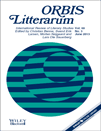
ORBIS LITTERARUM
Scope & Guideline
Navigating the Rich Tapestry of Literature
Introduction
Aims and Scopes
- Intertextuality and Literary Connections:
The journal frequently explores the intertextual relationships between different literary works, authors, and genres, highlighting how texts influence and converse with one another across time and space. - Cultural Criticism and Theoretical Frameworks:
A significant focus is placed on cultural criticism, employing diverse theoretical frameworks such as feminism, postcolonialism, and ecocriticism to analyze literature and its societal implications. - Methodological Innovations in Literary Studies:
ORBIS LITTERARUM showcases innovative methodologies, including computational literary studies, to analyze texts and their meanings, thus contributing to the evolution of literary analysis. - Historical Contextualization:
The journal emphasizes the importance of historical contexts in literary analysis, examining how literature reflects and responds to the socio-political dynamics of its time. - Exploration of Marginalized Voices:
There is a consistent focus on amplifying marginalized voices and perspectives in literature, addressing issues of identity, race, gender, and class.
Trending and Emerging
- Digital Humanities and Computational Analysis:
There is an increasing trend towards employing digital humanities methodologies, such as topic modeling and sentiment analysis, to explore literary texts and their connections, reflecting a broader integration of technology in literary studies. - Ecocriticism and Environmental Literature:
Emerging themes related to ecocriticism highlight the intersection of literature and environmental concerns, exploring how literary texts respond to ecological crises and reflect on human-nature relationships. - Intersectionality in Literary Studies:
A growing focus on intersectionality is evident, with more papers addressing the complexities of identity and power dynamics in literature, examining how race, gender, and class intersect in literary narratives. - Global Perspectives and World Literature:
There is a notable increase in research that seeks to understand literature from a global perspective, emphasizing cross-cultural dialogues and the interconnectedness of literary traditions. - The Ethics of Literature:
Recent works are increasingly concerned with the ethical implications of literature, exploring themes such as vulnerability, empathy, and the moral responsibilities of authors and texts.
Declining or Waning
- Traditional Literary Canon:
There is a noticeable decline in studies focused solely on the traditional literary canon, as the journal increasingly prioritizes works that challenge or expand these established narratives. - Purely Historical Literary Criticism:
The focus on purely historical literary criticism seems to be waning, with fewer papers dedicated to historical analysis without a contemporary or theoretical lens. - Conventional Genre Studies:
Research centered on conventional genre studies is less prevalent, indicating a shift towards more hybrid and cross-genre explorations that reflect the complexities of modern literature.
Similar Journals

STUDI FRANCESI
Nurturing Emerging Voices in Literary TheorySTUDI FRANCESI, published by Rosenberg & Sellier, is an esteemed journal in the fields of Cultural Studies, History, and Literature and Literary Theory. With an ISSN of 0039-2944, this journal has been a significant contributor to scholarly discourse since its inception in 1967. Operating from Turin, Italy, STUDI FRANCESI aims to explore and critical analyze the interplay between culture, literature, and historical context, reflecting diverse methodologies and perspectives that shape our understanding of the humanities. Despite being classified in Q4 quartiles according to the latest metrics, it offers a unique platform for emerging voices and innovative research, thus serving both seasoned academics and new researchers keen to delve into the nuances of Italian and European cultural heritage. Journals of this caliber are crucial for fostering academic dialogue and expanding the frontiers of knowledge, making it an invaluable resource for students, professionals, and scholars alike.

TWENTIETH CENTURY LITERATURE
Connecting Past Insights with Future DiscoveriesTWENTIETH CENTURY LITERATURE is a renowned journal published by Hofstra University Press, dedicated to the exploration and analysis of literature and literary theory from the twentieth century. With a focus on both established and emerging voices in the field, this journal serves as an essential resource for researchers, professionals, and students who seek to deepen their understanding of significant literary movements and trends. The journal holds an impressive Q2 category ranking in Literature and Literary Theory as of 2023, showcasing its impact and relevance in the academic community. Though not an open access journal, it provides valuable insights and scholarly discussions that contribute to ongoing debates in literature studies. Covering a converged period from 2002 to 2014 and continuing from 2016 to 2024, TWENTIETH CENTURY LITERATURE positions itself as a pivotal platform for thought-provoking literature critique and scholarly inquiry, making it an indispensable addition to any academic library or personal collection.
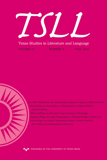
TEXAS STUDIES IN LITERATURE AND LANGUAGE
Celebrating the Intersection of Language and Literature in TexasTEXAS STUDIES IN LITERATURE AND LANGUAGE, published by University of Texas Press, is a distinguished scholarly journal dedicated to the exploration of the rich tapestry of literature and language from Texas and its encompassing regions. With its ISSN 0040-4691 and E-ISSN 1534-7303, this journal serves as a vital platform for researchers, educators, and students interested in the intersection of cultural studies, literary analysis, and linguistic inquiry. Despite the absence of Open Access, the journal remains an essential resource for those seeking rigorous academic discourse within the humanities. The journal, established in 1974, has published influential articles that contribute to a deeper understanding of Texas's unique literary heritage, making it a beacon of scholarship in American literature. The impact factor reflects its relevance and engagement in ongoing literary dialogues. We invite scholars and students alike to engage with the rich content provided, ensuring that Texas's literary legacy continues to be studied and celebrated.

JOURNAL OF MODERN LITERATURE
Navigating the Complexities of Contemporary Literary ThoughtJOURNAL OF MODERN LITERATURE, published by Indiana University Press, is a distinguished peer-reviewed journal that delves into critical examinations of modern literary texts and theories. Since its inception, the journal has served as a vital platform for scholars dedicated to the exploration of contemporary literature, making significant contributions to the discourse within the field. With an impressive ranking of Q2 in the Literature and Literary Theory category as of 2023, it positions itself among the top-tier journals in its domain, reflecting its strong impact within academic circles. This journal not only fosters scholarly dialogue but also embraces innovative approaches to literary criticism, ensuring relevance in today’s dynamic cultural landscape. Researchers, professionals, and students will find a rich repository of articles that engage with various modern literary paradigms, enhancing their understanding and appreciation of the intricate relationships between literature and broader socio-cultural contexts. Though it does not operate under an open access model, the journal's extensive reach through its digital ISSN (1529-1464) and print ISSN (0022-281X) allows for valuable insights to be disseminated to the appropriate audiences.
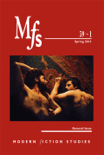
MFS-Modern Fiction Studies
Championing New Perspectives in Fiction AnalysisMFS-Modern Fiction Studies is a premier journal in the field of literature and literary theory, published by Johns Hopkins University Press. With an impressive impact factor and a 2023 classification in Q1, this journal stands out as a vital resource for scholars, researchers, and practitioners interested in contemporary fiction analysis and criticism. The journal aims to foster innovative scholarship, enhance discussions around literary trends, and explore the intricacies of modern narrative forms. Notably, it ranks #119 among 1,106 in the Scopus Arts and Humanities category, placing it within the top 89th percentile. Published four times a year, MFS is committed to making significant contributions to the understanding of modern fiction, making it a must-read for anyone vested in the evolution of literature. Access options are available through institutional subscriptions, ensuring that readers can engage with cutting-edge research and discourse in the literary community.

GERMANISCH-ROMANISCHE MONATSSCHRIFT
Connecting Cultures through Scholarly ExplorationGERMANISCH-ROMANISCHE MONATSSCHRIFT, published by UNIVERSITATSVERLAG C WINTER HEIDELBERG GMBH, is a vital academic journal dedicated to the fields of linguistics, literature, and literary theory. With its ISSN 0016-8904, this journal fosters scholarly discussions and disseminates innovative research that intersects Germanic and Romance languages and literatures. While it does not currently offer Open Access options, its contributions have positioned it within the Q4 quartile in both Linguistics and Language, and Literature and Literary Theory according to the 2023 category rankings. The journal's Scopus ranking reflects its emerging place within the academic community, situated at the 40th percentile for Literature and Literary Theory, and the 20th and 18th percentiles within Language and Linguistics, respectively. Scholars and students are encouraged to engage with this resource as it offers a platform for new perspectives that are pivotal to understanding the complex interrelations of these linguistic traditions, enriching both teaching and research initiatives.
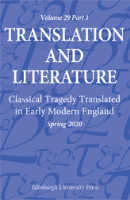
Translation and Literature
Elevating the Discourse on Translation's Literary ImpactTranslation and Literature is a leading academic journal published by Edinburgh University Press, focusing on the intricate relationship between language and literature within the realms of translation studies. With an ISSN of 0968-1361 and an E-ISSN of 1750-0214, this journal provides a crucial platform for scholars and practitioners to explore and disseminate research that addresses both the theoretical and practical aspects of translation. Since its inception in 1996, Translation and Literature has established itself as an essential resource, particularly noted for its contributions to the fields of linguistics and literary theory, as indicated by its Q4 ranking in both categories in 2023. The journal's articles are designed to foster dialogue across disciplines, encouraging innovative thinking and collaboration among researchers, professionals, and students alike. Access to this valuable resource is currently available through subscription, ensuring high-quality scholarship reaches a diverse audience dedicated to advancing the understanding of translation's role in literature.

REVISTA CHILENA DE LITERATURA
Advancing literary scholarship and dialogue.REVISTA CHILENA DE LITERATURA, published by Universidad de Chile, Facultad de Filosofía y Humanidades, is a premier open-access journal that has been at the forefront of literary scholarship since its inception in 2004. With its ISSN 0718-2295, the journal focuses on a wide array of topics within the field of literature and literary theory, striving to foster intellectual discourse and innovation. It has gained notable recognition, reflected in its Q2 category ranking in 2023, positioning it among the top journals in its field within the Scopus database, where it ranks #513 out of 1106 journals, placing it in the 53rd percentile. Hailing from Chile, the journal also serves as a vital platform for researchers and students to disseminate their work, enhancing the global dialogue in literature. With a history of convergence from 2007 to 2023, REVISTA CHILENA DE LITERATURA is committed to advancing literary research and its implications in contemporary contexts, making it an essential resource for anyone engaged in literary studies.
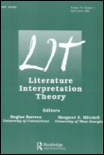
LIT-Literature Interpretation Theory
Illuminating Diverse Perspectives on Literary Texts.LIT-Literature Interpretation Theory is a premier academic journal that delves into the intricate relationships between literature and various interpretative theories, published by Routledge Journals, Taylor & Francis Ltd. With an ISSN of 1043-6928 and E-ISSN 1545-5866, this journal has established a notable reputation within the field, evidenced by its ranking in the 71st percentile among peers, and its placement in Q3 of the Literature and Literary Theory category for 2023. Since its inception in 1989 and continuing through 2024, LIT has aimed to provide a platform for the examination of literary texts through diverse theoretical lenses, catering not only to scholars and researchers but also to students and practitioners interested in literary discourse. Although it does not offer open access, the journal continues to be a vital resource for those seeking to enhance their understanding of literary theory within the arts and humanities. With robust insights and critical analyses, LIT contributes significantly to ongoing conversations in literature and promotes innovative interpretations that challenge conventional perspectives.

Cuadernos Lirico
Uniting Scholars to Illuminate Literary TextsCuadernos Lirico is a prestigious academic journal dedicated to the exploration of literature and literary theory, published by CUADERNOS LIRICO. With an ISSN of 2263-2158 and E-ISSN 2262-8339, this journal has been committed to open access since 2011, ensuring wide dissemination of its research across the globe. Based in France, the journal serves as a vital platform for scholars and practitioners, promoting innovative discourse within its field. Despite its current position in Q4 of the Literature and Literary Theory category and a Scopus rank of #993/1106, Cuadernos Lirico aims to bolster its impact through the publication of high-quality, peer-reviewed articles that contribute to the understanding and analysis of literary texts and theories. The journal invites contributions that engage with diverse perspectives and methodologies, fostering a rich dialogue among researchers, literary critics, and educators. Join us in advancing the scholarly pursuit of literature by contributing to this dynamic platform.